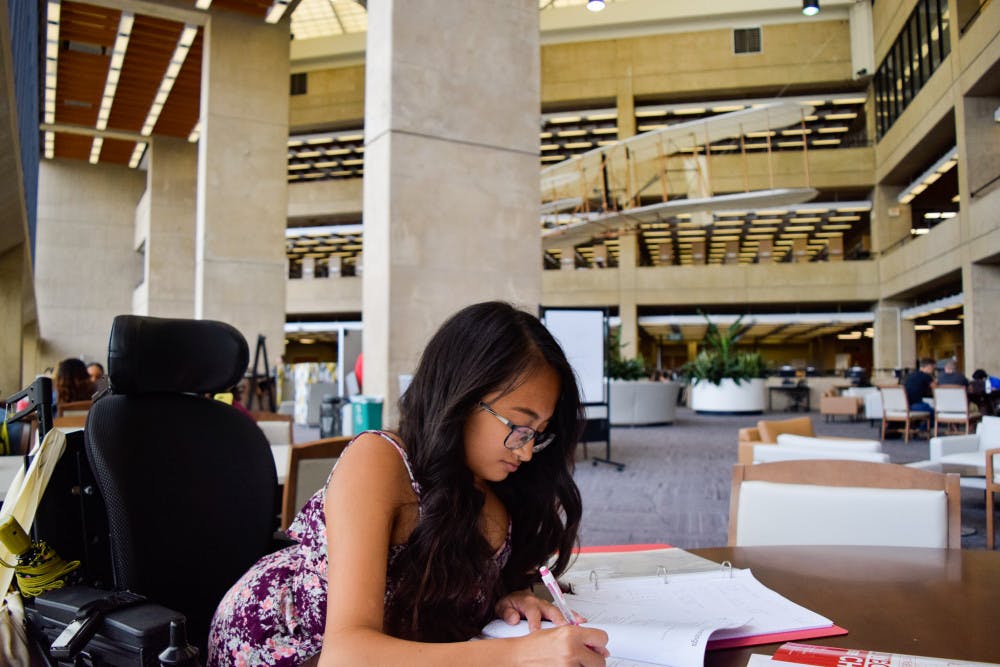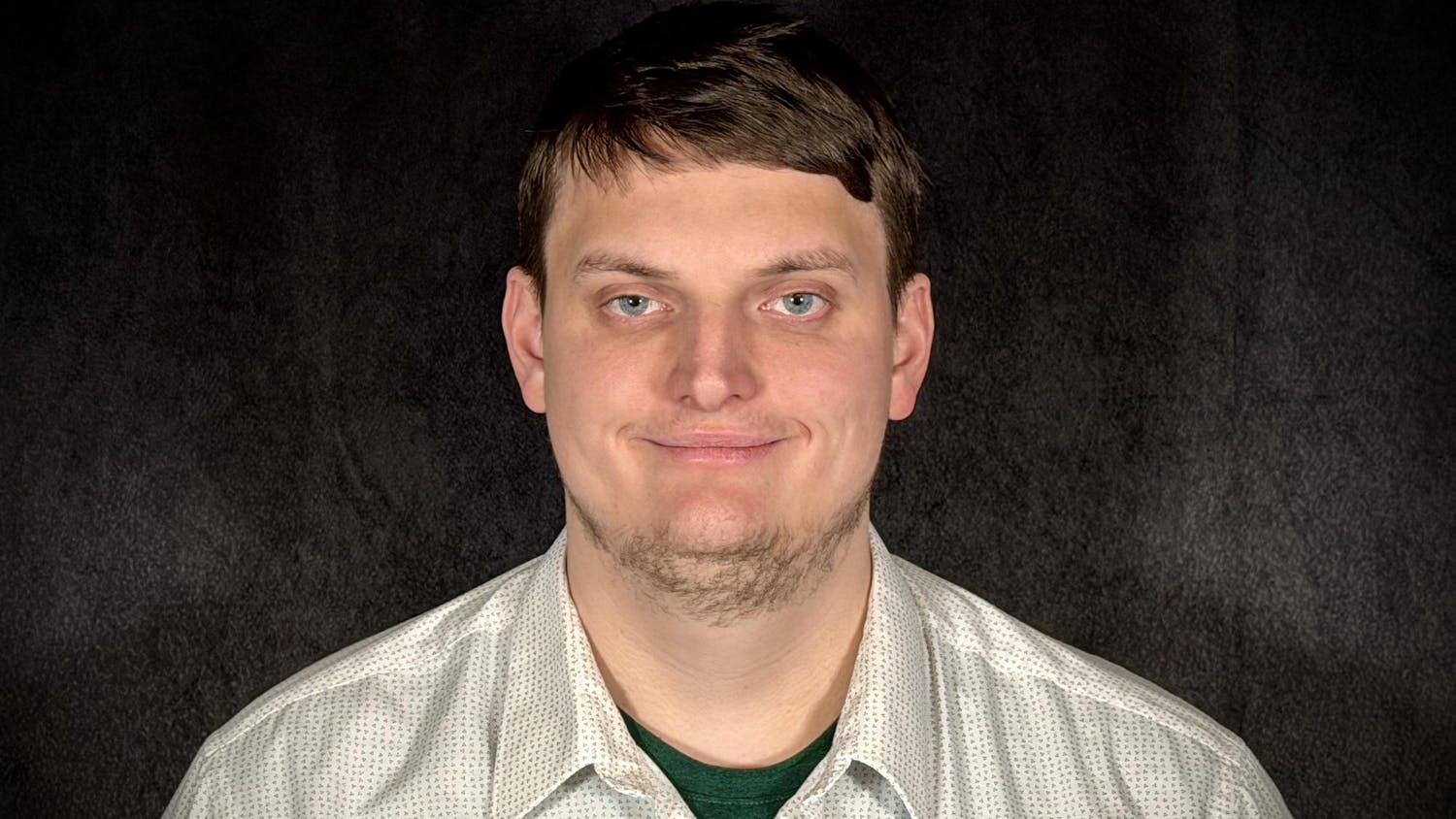Rebekah Wyse | Photo by Jessica Fugett | The Wright State Guardian
“I was born in Taiwan. My identical twin and I were adopted at 21 months old to go to the U.S. We were born with a condition called Osteogenesis Imperfecta (brittle bones disease,)” said Rebekah Wyse, junior in the social work program aiming towards a master’s degree.
“A couple years later, my parents became missionaries and I lived in China for nine years,” said Wyse. “In seventh grade, we moved back to the U.S. for school and surgeries.”
Taking inspiration from her experiences, Wyse plans to one day work in a children’s hospital.
With only a five-minute commute, Wyse began college life at Northwest State Community College (NSCC).
“I went to NSCC because I did only College Credit Plus (CCP) classes my senior year. Then I did another year because I got a scholarship. I wanted to get my general education done by completing the Ohio Transfer Module, which means I was done with all my general education courses. All in all, I transferred in with 50 credit hours,” said Wyse.
After transferring from NSCC, the search for the perfect school began. For Wyse, the perfect school looked like an accepting, welcoming community, affordable and accessible. Upon her search, Wright State University (WSU) became home.

“I visited Bowling Green State University, The University of Toledo, The University of Cincinnati. I wanted a place where I would feel comfortable, [and] I didn’t feel that [way about] the other places. [At WSU], I don’t get the ‘you have a disability’ look. You don’t feel awkward; I like that about WSU,” said Wyse.
A Residential Assistant (RA) in the Honors dorms, a transfer peer mentor and treasurer of Advocates for Cultural diversity and Excellence (ACE), Wyse is also working towards joining the Asian Student Association (ASA) and a social work club.
Along with all of the clubs Wyse is involved in, including Chinese Club, she is in the process of creating a disabilities group called “Abilities,” a group dedicated to educating others about physical and mental disabilities and starting a community on campus.
“We know that the campus is a lot more accessible than other campuses but I feel like it has been stagnant of making additional improvements,” said Wyse.
While holding an overall positive opinion of accessibility on campus, Wyse is excited to bring new ideas to the table to enhance WSU.
“Once we finally become an organization, we can advocate for things on campus,” said Wyse.
Among some improvements Abilities will advocate for are convenient and accessible handicap buttons and lowered soap dispensers in restrooms.

“I also want to figure out a better way to advertise how accessible WSU is to other high schools and community colleges,” said Wyse. “Especially advertising the tunnels that are on campus. I think we are missing a large population of students that could be attending WSU.”
Besides accessibility, Wyse voices the need for healthier appetizing food options on campus.
Working towards taking the steps to becoming an organization, Abilities recently had their first meeting with a turnout of 17 people and are in the process of voting on positions, looking for a staff advisor and starting a constitution.
Abilities also looks to promote leadership opportunities within group members, create new friendships and encourage accessibility improvements on campus.
Wyse plans to have a group meeting every other week; allies welcome.
“We should always be making steps to improving and fixing things,” said Wyse.
Of the many services that WSU provides, Wyse has a few favorites that help her throughout her day-to-day life.

“Paratransit has been absolutely wonderful. I don’t have to worry about not making it to class on days with bad weather. Even if it’s a sunny day, I don’t have to worry about getting sunburnt, large crowds of students [or] getting bit by mosquitoes on my way to class,” said Wyse.
With her busy schedule and project-involvement, Wyse works hard to erase the stigma of what it is to have a disability, proving that nothing is impossible.
“I just started to utilize Adapted Recreation by getting a Workout Buddy to help me in the gym and using the Counseling and Wellness Services for self-care. So that once a week I make sure that I take care of my body and mind. This way I’m healthy all throughout school, year-round,” said Wyse.
With the help of surgeries and treatments, Wyse can go one-to-five years without breaking any bones.
“Having brittle bones disease, I used to break a bone every 3-4 months when I was younger. Currently, I don’t need to take any medication for my bones. I can walk with a walker for a short distance. However, I use my power wheelchair to get around campus easier. Plus, it’s safer for me to be in my manual wheelchair even if I’m in the dorms,” said Wyse.
Wyse stresses the importance of being conscious of those with visible disabilities as well as disabilities that are less noticeable or unseen. If you don’t know, just ask.

“I can’t speak for everyone with a disability, but from [who] I’ve talked to, they’re pretty open about it. If you have a question, just ask. I’m not ashamed of having a disability. We’re human too,” said Wyse.
Whether a person is born with it or is diagnosed later in life, disabilities don’t discriminate.
“Any person at any [time] in their life can get a disability; anything can happen,” said Wyse. It’s what brought me to the states, having this type of education and [my] relationship with God.”
For Wyse, it’s important for people to know that being in a wheelchair does not define who she is and does not stop her from living life.










